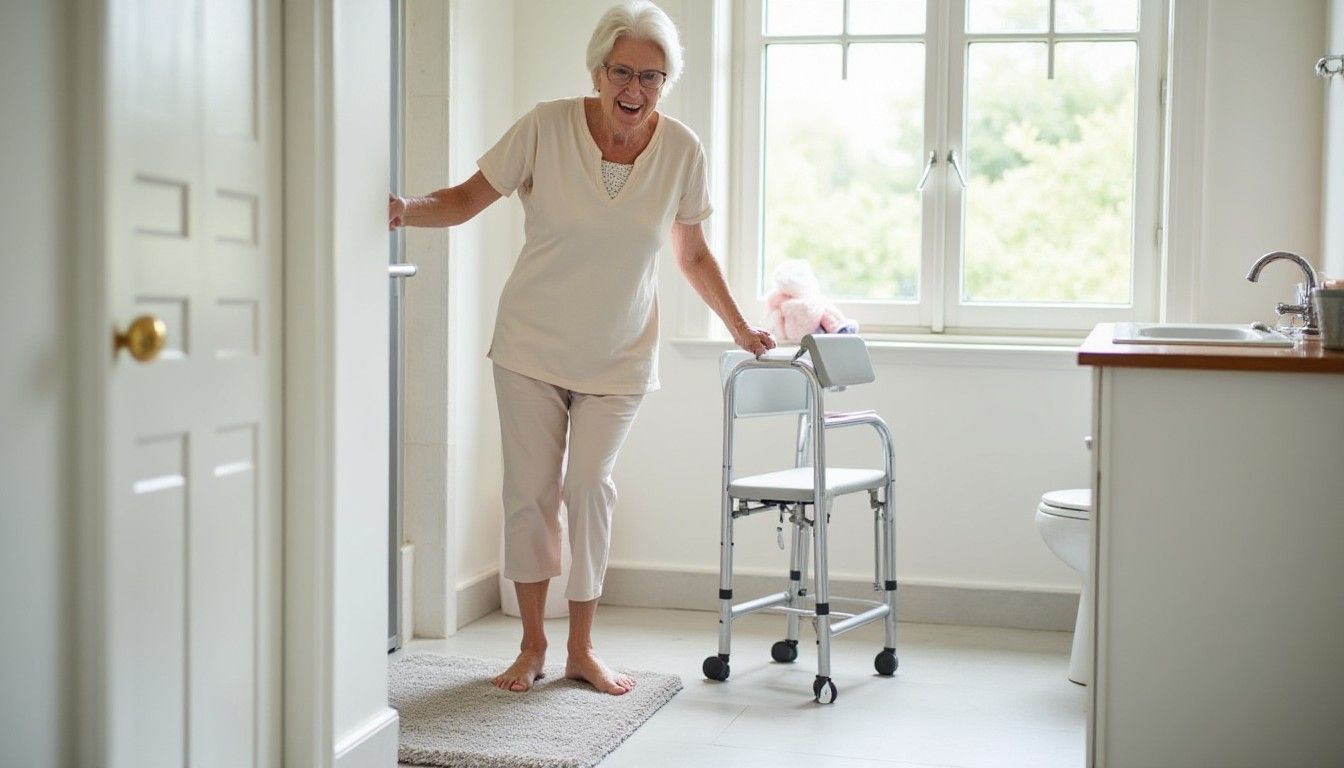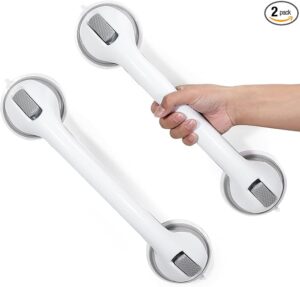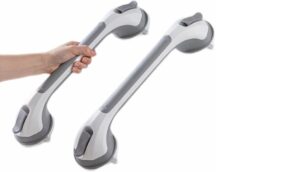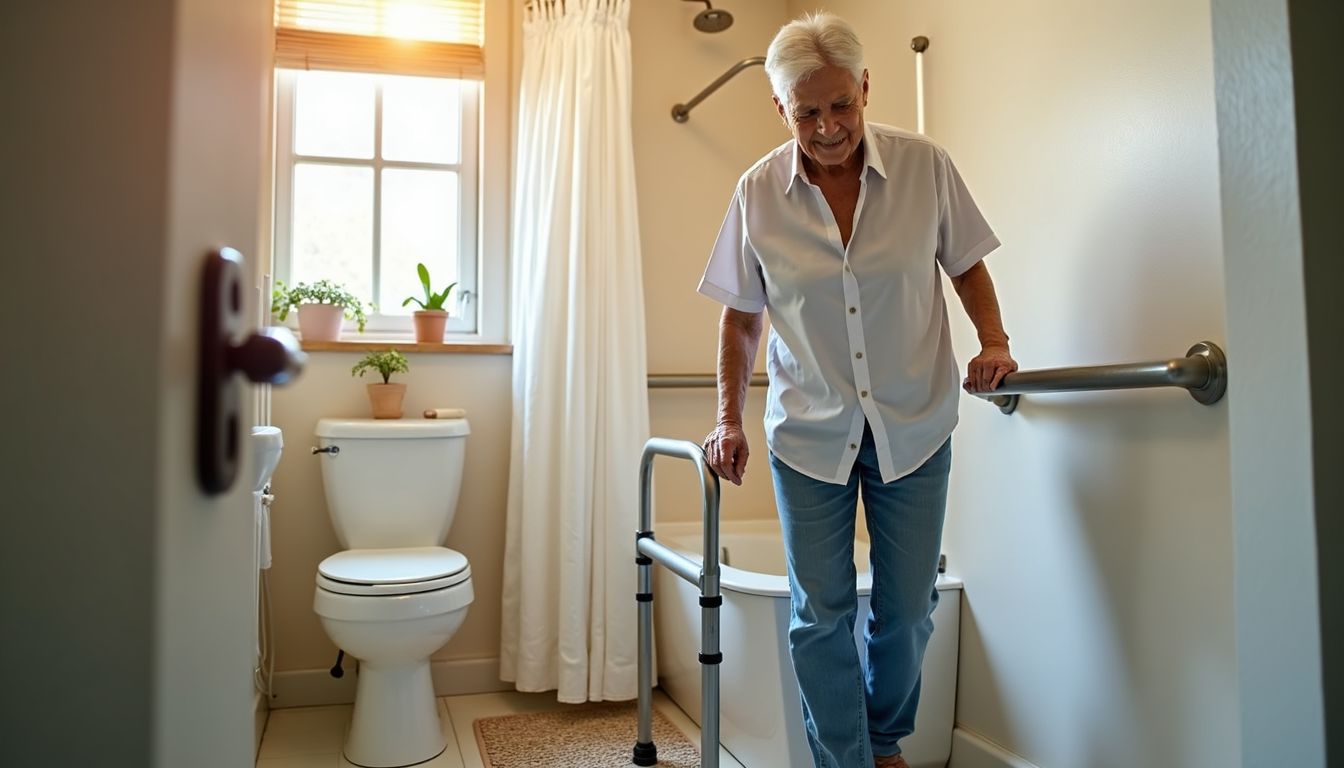🛁 Introduction
For many seniors, the bathroom is more than just a place to freshen up — it’s one of the most hazardous areas in the home. Slippery floors, hard surfaces, and the challenge of stepping in and out of the shower increase the risk of falls. This makes shower safety for the elderly a top priority, as studies show a significant number of accidents occur in the bathroom, often while showering.
That’s why It is so important. With the right precautions, seniors can enjoy their daily showers without fear of slipping or losing balance. Small changes like installing grab bars, using non-slip mats, or adding a shower chair can make a big difference in keeping older adults safe and independent.
This guide will walk you through the most common shower hazards seniors face, along with practical tips and recommended safety products. By the end, you’ll know how to create a safer, more comfortable shower routine for yourself or a loved one.
🚨 Why Shower Safety for the Elderly is Important
As people age, simple daily routines like taking a shower can become more challenging — and more dangerous. According to health studies, bathroom falls are among the leading causes of injury in seniors, often leading to broken bones, head injuries, or a loss of confidence in living independently.
Here’s why shower safety for the elderly matters so much:
1. High Risk of Slips and Falls
Wet tiles and soapy surfaces create a slippery environment. For seniors who may already have reduced balance or slower reflexes, this increases the chance of accidents.
2. Fragile Bones and Slower Recovery
Even a small fall can have serious consequences. Seniors often experience fractures or mobility issues after an accident, and recovery may take much longer than for younger adults.
3. Maintaining Independence
A safe shower routine helps elderly individuals continue living independently. Installing simple safety aids gives them the confidence to bathe without constant supervision.
4. Emotional Well-being
Fear of falling can cause seniors to avoid showers altogether, leading to hygiene and health issues. Proper shower safety measures not only protect their body but also boost their peace of mind.
⚠️ Common Shower Hazards for Seniors
When thinking about shower safety for the elderly, it’s important to first understand the biggest risks seniors face inside the bathroom. Most accidents happen due to simple, everyday hazards that often go unnoticed.
Here are the most common shower dangers for older adults:
1. Slippery Floors
Wet tiles and soap residue make the shower floor extremely slippery. Seniors with weaker balance or slower reflexes are at high risk of falling.
2. High Shower Entry Step
Many traditional bathtubs and showers require lifting a leg high to step in. For elderly individuals with arthritis, joint pain, or limited flexibility, this can be very unsafe.
3. No Support to Hold Onto
Without grab bars or handles, seniors may struggle to steady themselves when entering or exiting the shower. Grabbing unstable objects like towel racks can lead to accidents.
4. Poor Lighting
Dim lighting in the bathroom makes it harder to see wet spots, soap, or the shower step. Seniors with vision issues are especially vulnerable.
5. Slippery Soap and Shampoo Bottles
Soap, shampoo, and conditioner bottles often slip from the hands, causing seniors to bend down and lose balance.
6. Fatigue During Showering
Some elderly individuals get tired easily while bathing. Standing for long periods can make them dizzy or unsteady, increasing the risk of falls.
🛡️ Best Shower Safety Tips for the Elderly
Creating a safe bathroom doesn’t always require major renovations. Even small adjustments can make a huge difference in shower safety for the elderly. Here are some of the most effective tips:
1. Install Grab Bars in the Shower 🚪
Grab bars give seniors a strong and steady surface to hold while entering, exiting, or standing in the shower. They should be installed near the entrance and inside the shower for maximum safety.
2. Use Non-Slip Mats or Strips 🦶
Adding anti-slip mats or adhesive strips to the shower floor prevents accidental slips caused by water and soap.
3. Consider a Shower Chair 🪑
A sturdy shower chair allows seniors to bathe comfortably while sitting, reducing the risk of falls due to fatigue or dizziness.
4. Adjust the Shower Head 🚿
A handheld shower head makes bathing easier and safer, especially when combined with a shower chair. Seniors won’t need to move around as much.
5. Improve Bathroom Lighting 💡
Bright, well-placed lighting ensures seniors can see the floor clearly, making it easier to avoid hazards.
6. Keep Essentials Within Reach 🧴
Store soap, shampoo, and towels at an accessible height to prevent bending or stretching during showering.
7. Remove Clutter 🧼
Avoid unnecessary items on the shower floor, such as extra bottles, which can cause tripping.
8. Check Water Temperature 🌡️
Install an anti-scald device or set the water heater to a safe temperature to prevent burns from hot water.
👉 By following these shower safety tips for the elderly, families can significantly reduce risks and help seniors feel confident while bathing.
🛍️ Best Shower Safety Products for Seniors
Equipping the bathroom with the right tools is one of the most effective ways to enhance shower safety for the elderly. These products not only prevent falls but also make bathing more comfortable and stress-free.
Here are some of the best options:
1. Grab Bars and Handrails
Sturdy grab bars installed near the shower entrance and inside the bathing area provide seniors with something reliable to hold onto. Unlike towel racks, these are designed to support body weight safely.
2. Non-Slip Mats or Adhesive Strips
Place these mats inside the shower or tub and just outside on the bathroom floor. They create friction, helping prevent slips on wet surfaces.
3. Shower Chair or Bench
For seniors who get tired easily, a waterproof shower chair is a lifesaver. It allows them to sit while bathing, making the process safer and less tiring.
4. Handheld Shower Head
A detachable shower head makes it easy to direct the water flow without moving too much. It’s especially useful for seniors who use shower chairs.
5. Raised Toilet and Transfer Bench
Although not directly inside the shower, a raised toilet seat or transfer bench can improve overall bathroom safety by making movement easier for those with mobility challenges.
6. Anti-Scald Devices
These small but important tools prevent hot water from reaching dangerous temperatures, protecting seniors from burns.
7. Shower Caddies and Organizers
Wall-mounted caddies keep soaps and shampoos at an accessible height, reducing the need to bend down.
8. Motion-Sensor Bathroom Lights
Automatic lights ensure seniors don’t enter a dark bathroom, helping them move around safely at night.
👉 Investing in even a few of these products can greatly improve shower safety for the elderly, making the bathroom a safer, senior-friendly environment.
❓ Frequently Asked Questions About Shower Safety for the Elderly
1. Why is shower safety so important for seniors?
Shower safety is crucial because most home accidents for seniors happen in the bathroom. Wet floors, poor balance, and lack of support increase the risk of falls, which can lead to serious injuries like hip fractures.
2. What are the best products to improve shower safety for the elderly?
Some of the best products include grab bars, non-slip mats, shower chairs, handheld shower heads, and motion-sensor bathroom lights. These tools make bathing safer and more comfortable for seniors.
3. Are shower chairs safe for elderly people?
Yes, shower chairs are specifically designed for seniors and people with limited mobility. They allow individuals to sit comfortably while bathing, reducing the risk of slipping and fatigue.
4. How can I make the shower safer without major renovations?
Simple changes like installing grab bars, adding non-slip mats, using a handheld shower head, and ensuring good lighting can drastically improve shower safety without expensive renovations.
5. How do I help an elderly person who is afraid of showering due to fall risks?
Encourage them by making the bathroom safer with aids like shower chairs, grab bars, and anti-slip mats. Sometimes involving a caregiver during shower time also helps them feel more secure.
6. Should seniors avoid showers and take sponge baths instead?
Not necessarily. With the right safety measures, seniors can safely use showers. Sponge baths are an option if mobility is very limited, but showers promote better hygiene and comfort when made safe.
👉 With these tips and safety measures, families can ensure a secure bathing environment and reduce risks associated with shower safety for the elderly.
Maintaining shower safety for the elderly is essential to prevent falls and injuries. Simple upgrades like installing bathroom grab bars for elderly, using non-slip bathroom mats, or adding a swivel shower chair for elderly can make a big difference. Seniors who want to improve balance and mobility can also follow our 10 Easy Mobility Exercises for Seniors to stay active and independent around the house.







